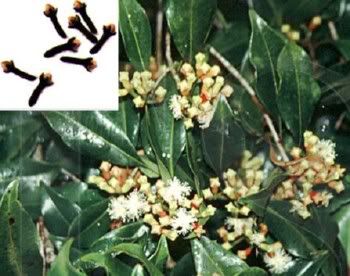

Syzygium aromaticum (also Caryophyllus aromaticus or Eugenia Caryophyllita)
Folk Names: Eugenia Aromatica
Description: Syzygium aromaticum is a member of the myrtle family. A broad-leaved tropical evergreen, it grows from thirty-three to forty feet. It is native to the Spice Islands, the Philippines, and Moluccas, and is also grown in Sumatra, Jamaica, the West Indies, and Brazil. The truck is erect with smooth grayish bark. The large, bright green leaves, five inches long or more, are opposite, ovate-acuminate, and leathery. Each is dotted with oil glands and sports a conspicuous stalk and veins. The entire plant gives off a fragrant odor when bruised.
Trees usually fruit eight to nine years after planting. The red and white flowers appear at the start of the rainy season in terminal corymb-like cymes, three to each branch. They are bell shaped with a cylindrical, yellowish to red gamosepalous calyx with five lobes, red petals, and a number of projecting stamens. If the seed is allowed to mature, it loses much of its potency. The fruit is a fleshy one- to two-seeded drupe, but it is the flower bud which is commercially harvested and dried while the petals are still closed. The dried bud resembles a light colored wooden ball on top of the calyx.
Effects: strong
Planet: Jupiter, Venus, Uranus Zodiac: Aquarius
Element: fire
Associated Deities:
Traditions:
The name clove comes from the Latin word clavus, meaning nail, which describes its
shape. The Greeks and Romans used cloves extensively in herbal medicine and some evidence
exists that it was one of the earliest plants used in Chinese medicine.
In third century BC, Han Dynasty courtiers seeking audience with the Chinese emperor were required to sweeten breath by chewing cloves, keeping it in their mouths for the duration of the interview. By the fourth century AD, there was much trade between the Arabs and Europeans for clove. A fierce trade war between the Portugal and Dutch broke out in the seventeenth and eighteenth centuries. The Dutch created a monopoly on trade by destroying all the trees but for those which grew on island of Ambon in the Spice Islands which they owned. This monopoly until the French managed to cultivate the tree on their own island plantations.
Magic:
Clove may be used as an incense for a variety of things. It is said to attract riches, drive
away hostile/negative forces, produce spiritual vibrations, purify, stop gossip, and increase
psychic ability (incense or tea).
Wear or carry to attract the opposite sex. Eat also as an aphrodisiac, and cloves or clove oil is an ingredient in love potions.
For an enduring friendship, fill two bags for you and your friend. Both of you should wear these around your necks. It may also be worn or carried in the pocket for comfort and solace.
Known Combinations:
Medical Indications: (Caution: The oil is very strong and can cause irritation if used in pure
form. It is recommended that it be diluted in Olive oil or distilled water, and the oil should never
be taken internally in large quantities or for an extended length of time unless supervised by a
health professional.) Parts Used: dried unopened flower buds, essential oil
Clove is an anodyne, anti-emetic, antiseptic, anti-parasitic, and digestive. It is often used
in combination with other herbs because it strengthens their power. The oil is often applied
topically to a toothache. It is used by dentist in fillings and cements and post-extraction
treatment. It is also applied topically for athlete’s foot. Mix it with Mint, Eucalyptus, and
Rosemary in Vaseline for an aromatic healing ointment.
A few drops oil in water should stop vomiting, and it is made into a tea for nausea and gas. In Bolivia, an infusion is made of a few cloves in boiling water for flatulence.
Ayurveda tradition suggests clove for fevers, dyspepsia, brain ailments, to tone heart, and to relieve kidneys, stomach, spleen, and intestinal disorders.
Nutrition:
The taste of clove is sweet and tangy. It is used in stewed fruit, hot spiced drinks, pickling
liquids, and marinades. The clove is ground into powder for use in breads, cookies, spice cakes,
pies, fruit dishes, curries, and some meat dishes. It is used whole to pickle onions, beets, souse
herring, and is used to stud in ham and gammon. An infused made with milk is used for sauces,
pies and puddings. Often cloves is used in conjunction with ginger.
Mercantile Uses:
The oil is used in tooth powder, mouthwash, soap, and lotion. It is found whole or used as
an oil in potpourris and used to stud an orange to make a pomander. Cloves also repel insects.
The Indonesians consume half of the world’s supply, mixing it with tobacco for special cigarettes.